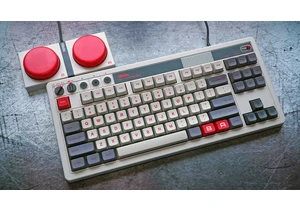An AMD representative said Thursday that the company is halting sales of its products to Russia. This seems to be the first explicit commitment from the chip industry in taking action against the Russian invasion of Ukraine.
According to AMD, the chip ban extends to Belarus, which Russia has used as a staging ground for its attacking forces. “Based on sanctions placed on Russia by the United States and other nations, at this time AMD is suspending its sales and distribution of our products into Russia and Belarus,” an AMD representative said in an email. “It is all AMD products and products we power (PCs, etc) in Russia and Belarus.”
On Feb. 24, the U.S. Department of Commerce implemented a new Commerce Control List-based license requirement for Russia. This requirement restricts exports to the country for key industries including “microelectronics,” avionics, navigation equipment, and more. Essentially, the new export rules blacklist Russia and businesses operating there from legally buying the restricted goods.
To date, however, the chip industry has been somewhat vague in how it has reacted to the ongoing Ukraine conflict.
On Feb. 26, for example, an Intel representative merely said that “Intel complies with all applicable export regulations and sanctions in the countries in which it operates, including the new sanctions issued by OFAC and the regulations issued by BIS.” At the time, the representative declined to comment further when asked if that indicated a specific ban on sales to Russia. A source close to Taiwan Semiconductor Manufacturing Co. (TSMC), the world’s largest and most important fab, told the Washington Post that the foundry has suspended all sales to Russia and to third parties that supply products to Russia. On the record, however, a TSMC representative told the paper that it would simply comply with the new export rules.
Compared to the overall market, however, chip sales to Russia represent a small fraction of total sales. On Feb. 24, the Semiconductor Industry Association released a statement that characterized Russia as “not a significant direct consumer” of semiconductors.
“While the impact of the new rules to Russia could be significant, Russia is not a significant direct consumer of semiconductors, accounting for less than 0.1% of global chip purchases, according to the World Semiconductor Trade Statistics (WSTS) organization,” the SIA said in a statement. “The broader Russian ICT market totaled only about $50.3 billion out of the $4.47 trillion global market, according to 2021 IDC data.
“In addition, the semiconductor industry has a diverse set of suppliers of key materials and gases, so we do not believe there are immediate supply disruption risks related to Russia and Ukraine,” the SIA added.
The AMD representative echoed what the SIA said, specifically regarding its own supply chain. “Currently, we do not believe that the conflict will impact our ability to provide products, support, and services to our partners and customers,” the AMD representative said in his email.
A representative for Intel didn’t have any further comment when reached Thursday morning. Representatives for Nvidia did not immediately respond to a request for comment. https://www.pcworld.com/article/619357/amd-officially-halts-chip-sales-to-russia.html
Autentifică-te pentru a adăuga comentarii
Alte posturi din acest grup

Cybersecurity can be complicated. (I sat in on a pentesting session d

When you’re making a computer known for being super-cheap, every penn


E-ink tablets are becoming well known; color e-ink tablets are quietl

Google said Thursday that it has begun migrating its “AI Mode” out of

AOC is typically considered a budget brand, or at least a solid step

With odious import taxes now coming into effect, electronics sellers
